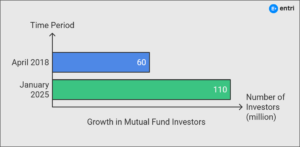Table of Contents
Are you a beginner planning to invest in mutual funds? Are you confused about the different types that are out there? Do not worry, we got you. This blog is all about how to choose the right mutual funds to invest in as a beginner.
Check out this video by Entri in Malayalam!
Introduction
Doing something new may not be everyone’s go-to thing, especially when it involves money. If you are new to investing, mutual funds can be confusing. But that’s alright! This blog helps you to give a simplified idea about how mutual funds work and which one you should choose and invest in as a beginner. Mutual funds are considered to be one of the easiest and safest ways for beginners to start investing.
Mutual funds are like a big basket of various investments, including stocks and bonds. These investments are managed by experts or fund managers who make sure that you get maximum profit from these. This is because you and others contribute to the investments in the basket and thus own a small portion of it. Now that you have an idea as to how mutual funds work, let us dive in and see which mutual fund you should choose to invest in as a beginner.
Understand your Investment Goals
1: What is a stock?
Before investing, you need to decide as to why you are investing. This may sound ridiculous, but this is the way to know which mutual fund is the best one for you. The reasons for investing can be numerous and may include saving for retirement, a home, your children’s education, or just trying to grow some money over time. We have devised two groups under which you can put your reason:
- Short-term goals—like buying a car or a vacation (requires more conservative investments)
- Long-term goals—like saving for retirement (the possibility of taking risks and investing in funds that focus on growth)
Once you have decided the reason for investing, you can easily choose a mutual fund that aligns with your desired time frame and objective.
Know the Different Types of Mutual Funds
As you already know, there are many types of mutual funds, and the confusion on which one to choose brought you here. Imagine you went to a store to buy a bar of chocolate. The store has a lot of options to choose from, and you do not know any of them. The natural thing to do is to familiarise yourself with all of them by either doing a bit of research or asking a friend.
In the same way, it is necessary to have an idea and understanding of the different types of mutual funds before choosing one. You can research all the types or even ask someone (like us). We have made a list of the types of mutual funds that cater to different needs.
- Equity funds: Invests mainly in stocks and are great for long-term growth, but they come with higher risks
- Debt funds: Invests in bonds and are typically safer than equity funds, but offer lower returns
- Hybrid funds: Invests in a mix of both stocks and bonds, resulting in a mix of risk and reward
- Index funds: They track a market index like the Nifty 50 and often have lower fee
Everyone has their own goals and risk appetite, and therefore choosing the right type of mutual funds is highly subjective. The maximum one can do is to be aware of all the types of mutual funds and choose the one that aligns with their goals.
Assess Your Risk Appetite
By now, you must have an idea as to how different mutual funds come with different levels of risk. Based on your capital or the amount you want to invest and the timeframe that you wish for it to mature, you need to assess how much you can risk. The risk factor is always there in this game, and a good understanding of this is the only way to seal your future. Introspect yourself on the basis of these:
- Low risk: If you prefer lower risks, debt funds are suitable as they have lower risk but lower returns
- Moderate risk: Hybrid funds can provide decent returns with a moderate level of risk
- High risk: Equity funds can offer higher returns, but at the same time, they can cause high chances of losing your money
Pro tip: If you can handle the ups and downs of the market, go ahead with the riskier funds. Rather, if you prefer stability and a steady income, choose the safer ones.
Check Fund Performance and Past Returns
Imagine buying a smartphone that came out recently. You would definitely check for the positives and negatives of the smartphone that have been stated by probably reviewers on YouTube. Such careful planning happens for a smartphone purchase because we need it to be valuable for the money we spend on it.
Mutual funds need to be approached in the same way. When deciding on a fund type, we need to check on its past performances as well as how the returns were gained. However, previous performance may not help in predicting the current or the future performance; rather it gives an idea as to how the fund was faring. A history of losses wouldn’t be the ideal fund to choose. Look for a fund with consistent performance history over the past 3-5 years. Understand how the fund performed across different market conditions.
Stock Market Training Reviewed & Monitored by SEBI Registered RA
Trusted, concepts to help you grow with confidence. Enroll now and learn to start investing the right way.
Know moreExpense Ratio and Fund Management
What is an expense ratio? An expense ratio is the annual fee a mutual fund charges you to manage your money. This fee is usually deducted from the fund’s returns; therefore, if the fund that you have been thinking about has a high expense ratio, it may actually eat into your returns.
Check out funds with lower expense ratios so that it won’t cost you your returns, especially if you are investing for a long term. Additionally, have good research about the fund manager as well. A good and skilled fund manager can make a big and impactful difference in how your invested money grows.
SIP vs. Lumpsum: Which One to Choose?
Mutual funds have two types of investment plans: SIP and lumpsum. Systematic Investment Plan (SIP) lets you invest a fixed amount regularly, like monthly. It is regarded as being the safest and perfect option for beginners, as it helps you invest consistently, take advantage of market fluctuations, and even avoid trying to time the market.
Lumpsum refers to when you invest a large amount all at once. This is considered to be riskier as the market may fluctuate, and you may be investing at a bad time, resulting in a loss.
For beginners, it would be better to choose SIP, as it would help them in getting returns in the long run.
Tax Implications of Mutual Funds
Now we reach an important aspect of mutual funds: tax implications. Different types of mutual funds have different tax treatments. In equity funds, you would have to pay a lower tax rate if you hold them for more than 3 years. This would be long-term investment generally. If you sell before 3 years, you may have to pay a higher tax. This is to discourage investors from discontinuing investments.
Debt funds are taxed at a slightly higher rate, especially if sold before the 3 year threshold. Be sure to check the tax implications of the mutual fund you want to choose and consult a tax expert if you are not sure how to approach it. Tax can eat into your returns as well.
| Gain Financial Literacy in your Mother Tongue | |
| Stock Market Course in Malayalam | Mutual Funds Course in Malayalam |
| Stock Market Course in Tamil | Mutual Funds Course in Tamil |
| Stock Market Course | Mutual Funds Course |
How to Start Investing in Mutual Funds?
By now, you must have an idea as to how you should choose the right mutual fund to invest in as a beginner. Now all that is left is to actually invest in. It is way easier than it sounds and doesn’t require a lot of hassle. Here is a simplified step-by-step guide on how to start investing in mutual funds:
- Choose a mutual fund: Remember all the factors that need to be considered before choosing.
- Open an account: You can do this through a bank, online platforms, or directly with the fund house.
- Start with SIP: Set up a monthly SIP plan, according to your convenience
- Monitor: Check your investment on a regular basis and not too often. Remember, patience is the key.
The Right Mutual Fund for Beginners: Conclusion
Choosing the right mutual fund is the right step towards gaining financial independence. Being a beginner, having to deal with it can be overwhelming. But with the right guidance and research, you can turn it into a walk in the park. The key is to clearly understand your reasons or goals for investing, your risk appetite or tolerance, and the type of mutual fund that actually aligns with your plans.
Start with simpler fund types like equity and debt, according to your risk tolerance. Use SIPs to stay consistent and thus build a strong financial foundation over time. Investment is like a marathon; it takes time to reach the finish line. Keep monitoring but do not make any hasty decisions based on short-term market movements. Mutual funds are just one type of investment option. Over time, you can diversify your portfolio and invest in other fields.
If you feel like you need to learn a bit more about mutual funds and the investment procedure, check out Entri’s mutual funds course. With expert guides and top-quality materials, you are bound to master the investment type with ease. You can also check out Entri’s other courses, like the forex trading course and the stock market course. The most important thing in any type of investing is to start investing early and make informed choices that suit your financial situation and goals. So invest now and secure your future!
Stock Market Training Reviewed & Monitored by SEBI Registered RA
Trusted, concepts to help you grow with confidence. Enroll now and learn to start investing the right way.
Know moreFrequently Asked Questions
What are mutual funds?
Mutual funds are investment vehicles that pool money from multiple investors to invest in a diversified portfolio of stocks, bonds, or other securities. They are managed by professional fund managers.
Why should beginners consider investing in mutual funds?
Mutual funds are a great option for beginners because they offer diversification, professional management, and lower investment risks compared to individual stocks. They also allow investors to start with a smaller amount of capital.
How do I choose the right mutual fund?
Start by determining your investment goals, risk tolerance, and time horizon. Research different types of mutual funds (e.g., equity, debt, hybrid) and check their performance, fees, and fund manager’s track record. Diversifying your investments across different sectors and funds is also essential.
What are the different types of mutual funds?
The main types of mutual funds include:
-
Equity funds: Invest in stocks and are riskier but offer higher returns.
-
Debt funds: Invest in bonds and are less risky but provide moderate returns.
-
Hybrid funds: Invest in both stocks and bonds to balance risk and return.
-
Index funds: Track a market index (e.g., S&P 500) and generally have lower fees.
What is the risk level associated with mutual funds?
The risk level depends on the type of mutual fund you choose. Equity funds are riskier but offer higher potential returns, while debt funds are less risky but tend to offer lower returns. Always choose a fund that aligns with your risk tolerance and financial goals.
How do I assess a mutual fund’s performance?
Look at the mutual fund’s historical performance, but remember that past performance doesn’t guarantee future results. Consider factors like long-term performance, consistency, and how the fund performed during market downturns. Always compare the fund’s performance to a relevant benchmark index.















